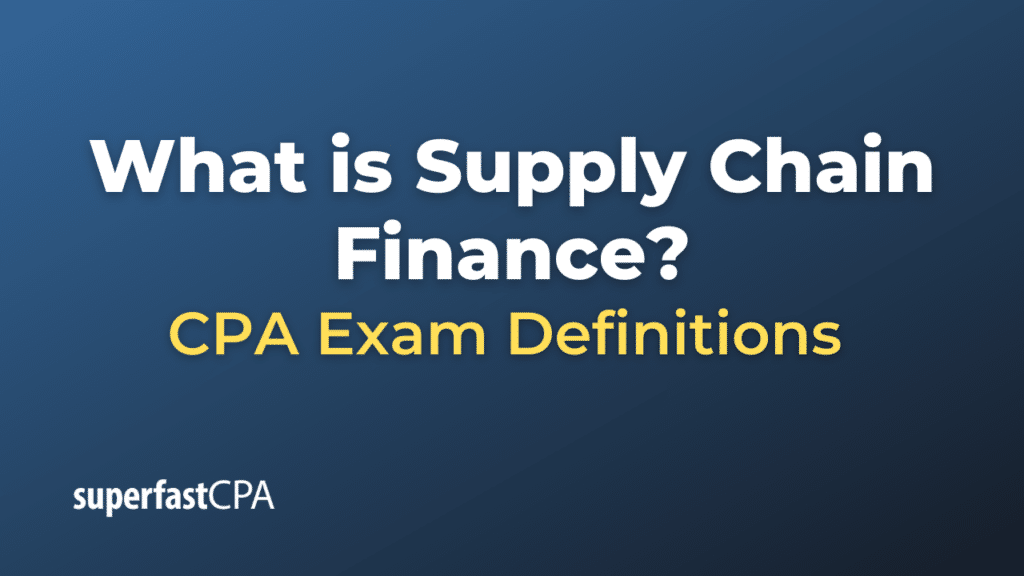Supply Chain Finance
Supply Chain Finance (SCF) is a set of technology-based solutions that optimize cash flow by allowing businesses to extend their payment terms to suppliers while providing the option for suppliers to get paid early. It’s a collaborative approach to finance in which buyers and suppliers work together to ensure that financing costs are reduced and both parties can optimize their working capital.
Here’s a simplified overview of how SCF works:
- Buyer places an order with the Supplier: This is the standard start to any commercial transaction.
- Supplier delivers goods and submits invoice : Once the order is fulfilled, the supplier issues an invoice to the buyer.
- Invoice is approved by Buyer: The buyer confirms that goods/services have been received and are in order.
- Invoice is sent to the Financing Institution: Instead of waiting for the buyer’s payment, the supplier has the option to present the approved invoice to a bank or another financial institution to get an immediate payment, but at a discount.
- Financing Institution pays the Supplier: Based on the approved invoice, the financial institution pays the supplier immediately (minus a discount or financing fee).
- Buyer pays the Financing Institution: On the due date of the invoice (or according to agreed payment terms), the buyer then pays the full invoice amount to the financing institution.
The key benefits of Supply Chain Finance include:
- Improved Cash Flow for Suppliers: Suppliers can receive payment faster without having to wait for the standard invoice due date, which helps improve their liquidity and manage cash flow better.
- Extended Payment Terms for Buyers : Buyers can negotiate longer payment terms with suppliers, which can improve their own working capital and cash flow position.
- Reduced Supply Chain Risk: With better financial flexibility, suppliers are less likely to run into financial difficulties that could disrupt the supply chain.
- Win-Win for Both Parties: Suppliers get paid sooner, and buyers can potentially negotiate better terms or ensure a more stable supply chain.
- Access to Cheaper Financing: Since the financing institution’s risk is based on the creditworthiness of the buyer (usually more creditworthy than the supplier), the financing rates are typically lower than what suppliers might get on their own.
It’s worth noting that with the evolution of technology, particularly in the fintech sector, there are now various digital platforms offering SCF solutions, making the process more efficient and accessible to a larger number of businesses.
Example of Supply Chain Finance
Let’s illustrate Supply Chain Finance (SCF) with a fictional scenario involving two companies: ElectroTech (the buyer) and BatteryCo (the supplier).
Scenario:
ElectroTech manufactures electronic gadgets and requires batteries for its products. BatteryCo is a key supplier for ElectroTech. Normally, ElectroTech pays invoices from BatteryCo in 60 days. However, BatteryCo sometimes struggles with cash flow because it needs funds sooner to pay its workers and manage its operations.
The two companies agree to use a Supply Chain Finance solution offered by BankCorp, a financial institution.
Supply Chain Finance in Action:
- Order Placement: ElectroTech places an order for $100,000 worth of batteries.
- Goods Delivery & Invoice Submission: BatteryCo delivers the batteries to ElectroTech and sends an invoice with 60-day payment terms.
- Invoice Approval: ElectroTech confirms that the batteries are received in good order and approves the invoice. ElectroTech then uploads this approved invoice to BankCorp’s SCF platform.
- Immediate Payment Option: BatteryCo, not wanting to wait for 60 days, decides to get paid immediately. They request early payment from BankCorp through the SCF platform.
- BankCorp Pays BatteryCo: BankCorp reviews the approved invoice and offers to pay BatteryCo $98,000 immediately. This amount is $2,000 less than the invoice value, which is the financing fee or discount for the early payment.
- ElectroTech Pays BankCorp: At the end of the 60-day payment term, ElectroTech pays the full invoice amount of $100,000 to BankCorp.
Outcome:
- BatteryCo receives $98,000 immediately instead of waiting 60 days, allowing them to manage their cash flow better and continue their operations smoothly.
- ElectroTech maintains its 60-day payment term without pressuring its relationship with BatteryCo. They also ensure that BatteryCo remains financially stable, ensuring a steady supply of batteries.
- BankCorp earns $2,000 from the transaction as a financing fee, with the risk being based on ElectroTech’s creditworthiness.
This example highlights the win-win nature of SCF. BatteryCo can access funds early, ElectroTech can potentially negotiate better terms and ensure a steady supply, and BankCorp earns fees while facilitating the entire process.













